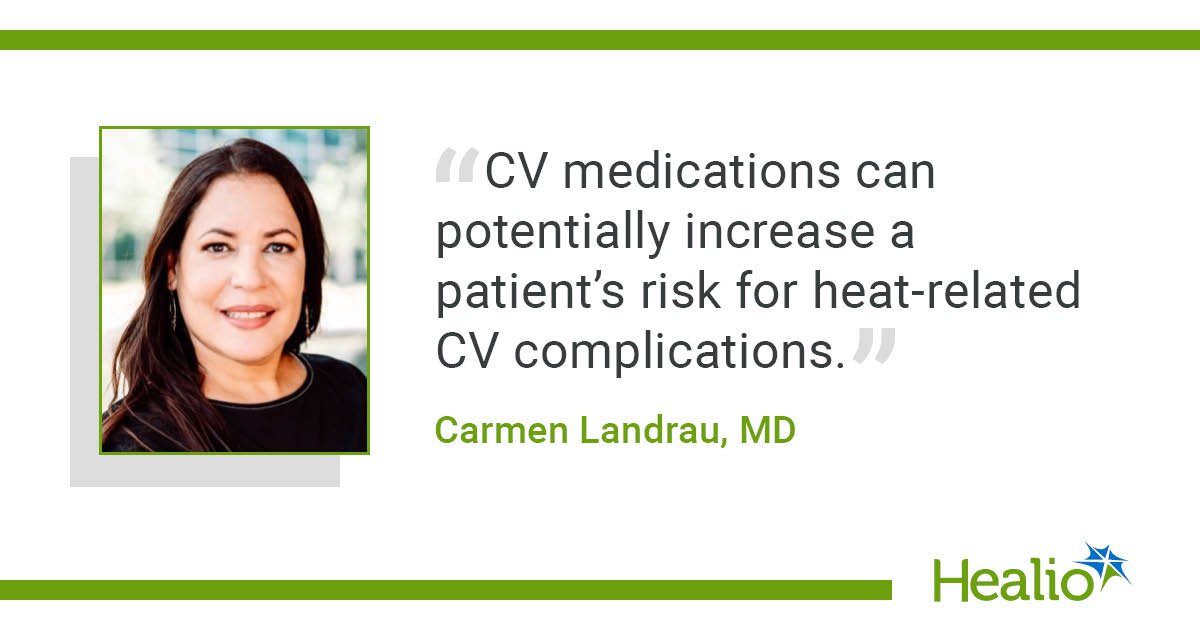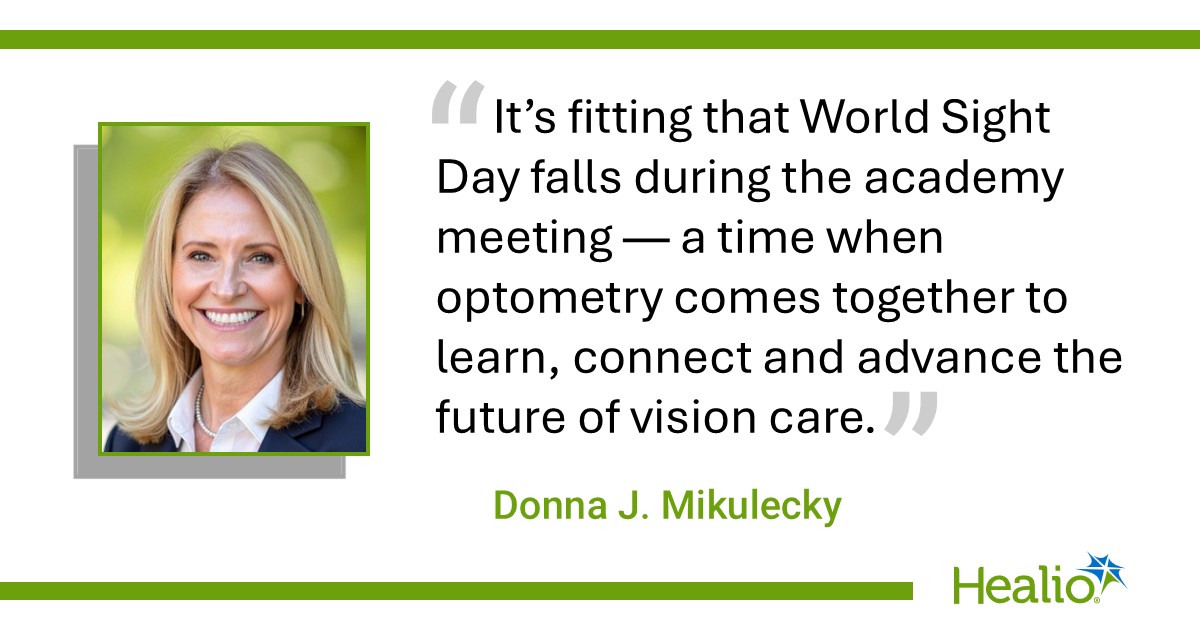August 01, 2025
5 min read
Key takeaways:
- Extreme heat exacerbates CV risk, especially among older adults and those with a history of heart disease.
- A cardiologist provides tips on how to reduce risk for heat-related CV events.
Extreme heat can be dangerous to individuals’ heart health, especially if one has preexisting cardiovascular disease or is taking certain CV medications, elevating their risk for heat-related illness.
In June, a heatwave descended on the U.S. Central and Eastern regions, impacting more than 100 million Americans, with several Northeast communities exceeding prior heat records by more than 2°F, according to a report by the National Oceanic and Atmospheric Administration (NOAA).

June was ranked by NOAA as the seventh warmest month in the 131 years of U.S. temperature recordings.
Prior data published in Circulation painted a foreboding outlook for CV health as temperatures continue to rise.
As Healio previously reported, heat-related CV death is projected to increase approximately 162% in the U.S. between now and 2065, with the greatest burden on Black individuals and older adults.
The CDC recommends individuals with heart disease create a heat action plan with their physician.
Healio spoke with Carmen Landrau, MD, cardiologist at Memorial Hermann Hospital-Texas Medical Center, professional speaker and American Heart Association volunteer expert, about how heat exacerbates CVD events, who is most at risk and what can be done to reduce risk for heat-related adverse events.
Healio: Why does heat exacerbate CV risk?
Landrau: Heat places additional stress on the heart and CV system. This can worsen HF and precipitate ACS, acute MI, arrhythmias and stroke, and contribute to excess mortality.
Some of the effects of heat in the CV system are:
- Increased heart rate and low BP. Heat causes the blood vessels to dilate to cool our bodies, which may lead to a decrease in BP. As BP drops, the heart rate increases to maintain cardiac output. The more the heart has to pump, the more stress is put on the heart.
- Reduced blood volume and dehydration. Sweating can lead to a decrease in blood volume, which can also lead to decreased BP causing the heart to pump harder to maintain BP and send an adequate amount of blood to the other organs.
- Electrolyte imbalance. Changes in electrolytes — magnesium and potassium — can cause arrhythmias and lead to heart attacks and even stroke.
- Blood clots. The reduction in blood volume and dehydration caused by high temperatures can lead to blood clots by making the blood “thicker.” Patients experience higher viscosity due to loss of body fluids if not properly hydrated in high temperatures.
Healio: How do CV symptoms manifest in the heat?
Landrau: Extreme heat can significantly strain the CV system, leading to increased workload. Blood flow to the skin increases to dissipate heat, which, in turn, increases the heart rate. This increase in workload can lead to palpitations, the sensation of your heart racing or pounding, even at rest.
Shortness of breath may occur due to the increased demand on the heart and potentially decreased lung function, which can make breathing difficult. Patients may also experience chest tightness or pain, but these could also be a sign of a heart attack.
Healio: Who are most at risk for CV complications from excessive heat?
Landrau: Those at highest risk for experiencing CV complications from excessive heat are the older adults and individuals with preexisting CV conditions.
Additionally, people with diabetes or lung disease are also more vulnerable.
Non-Hispanic Black adults are also identified as a group with increased risk for heat-related CV deaths.
People who are 65 years and older may not regulate temperature as effectively. In addition, they may have underlying CV or other health conditions that are exacerbated by heat.
In those with preexisting conditions, like high BP and stroke, there is higher risk for heat-related complications since their systems are already affected and may not tolerate the stress as well as those without health issues. These patients may also be taking medications that can interfere with the body’s ability to regulate temperature or increase the risk of complications in hot weather.
Healio: Are there any CV-related medications that may make patients more prone to CV complications in the heat?
Landrau: CV medications can potentially increase a patient’s risk for heat-related CV complications.
Patients taking diuretics may suffer from dehydration and electrolyte imbalance in hot weather. These medications are commonly used in patients with high BP and HF, so it is important to inform them to maintain good hydration, especially in higher temperatures.
People who take beta-blockers may lose the ability to regulate temperature and blood flow, having an increased risk of heat stroke.
In patients taking antiplatelet medications such as aspirin or clopidogrel, reduced blood vessel dilation may hinder their body’s ability to effectively reduce its temperature and cool down.
The combination of ACE inhibitors or angiotensin receptor blockers with diuretics can significantly increase risk for heat-related complications.
Healio: How can CV risk be lessened in the heat?
Landrau: Heat stroke is preventable. The following tips may help prevent it:
- Wear loose-fitting, lightweight clothing. Clothes made of linen, silk, cotton or hemp are cooling.
- Protect against sunburn. Wear a wide-brimmed hat and sunglasses. Use a broad-spectrum sunscreen with an SPF of at least 15. Apply sunscreen generously and reapply every 2 hours. If you are swimming or sweating, reapply more often.
- Stay hydrated by drinking plenty of fluids.
- Take precautions with certain medications.
- Never leave anyone in a parked car. This is a common cause of heat-related deaths in children.
What are the symptoms of heat exhaustion and how can it impact the heart?
Landrau: People who suffer from heat exhaustion may experience headaches, dizziness or lightheadedness. Their skin may feel cool to the touch and may appear pale and moist. The pulse may be fast and/or weak. In addition, they may experience weakness, muscle cramps, nausea or vomiting or even fainting — passing out.
Healio: What are the symptoms of heat stroke and how can that affect the heart?
Landrau: In heat stroke there is high body temperature — 103°F or higher. The skin is hot, red, dry or damp. The pulse will be fast and strong, and the patient may complain of headache, dizziness and confusion. There may also be nausea or passing out.
Healio: Anything else you would like to say about heat and CV risk?
Landrau: Exercising should be safe and fun, but check with your physician before starting any exercise, especially in hot weather. Inform your doctor if you are experiencing symptoms or have a specific medical question or chronic disease. Although certain heart medications can exaggerate the body’s response to heat, it’s always important to take them as prescribed and not make any changes or stop taking them unless instructed otherwise by your physician.
For more information:
The American Heart Association can be reached at ahacommunications@heart.org or by calling 1-800-AHA-USA1.










